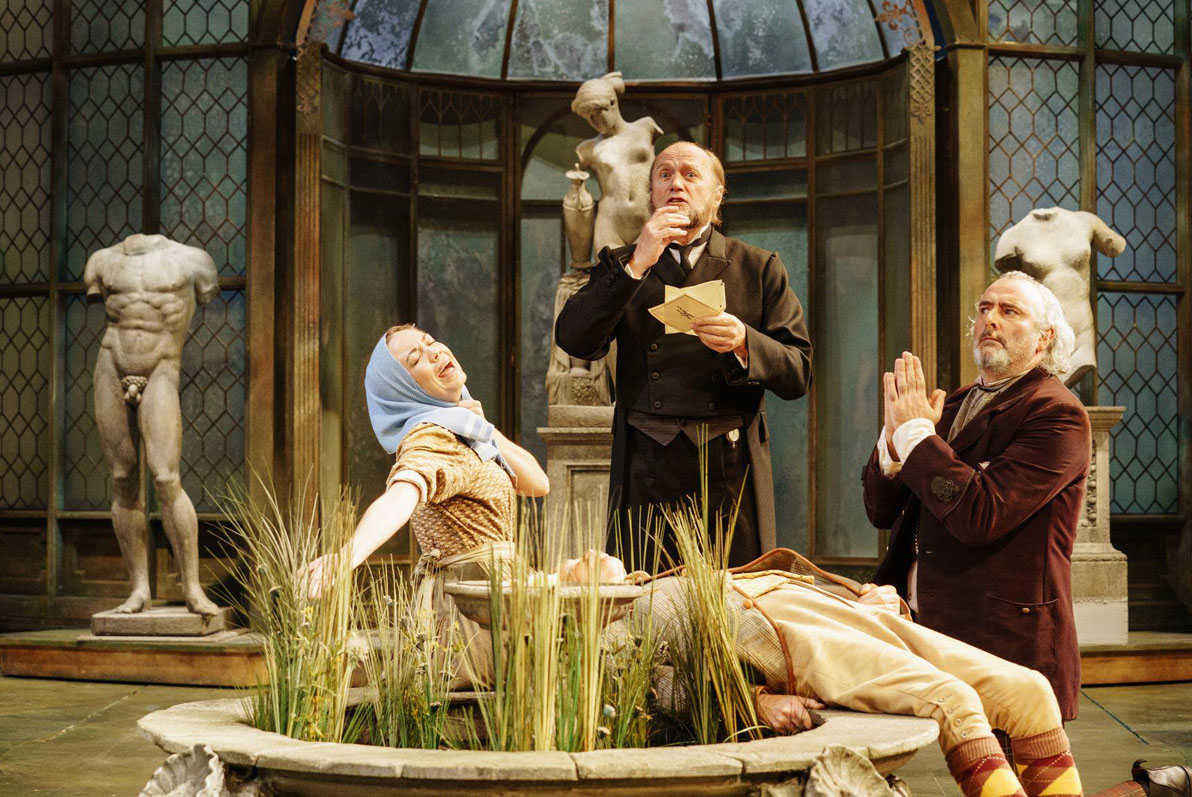
What do you get if you blend Shakespeare with panto, musicals, Arts and Crafts and Indian and Oscar Wilde influences? The answer from director Christopher Luscombe and designer Simon Higlett, is a delightful production that shows The Bard to be infinitely enjoyable, adaptable and pertinent.
So what’s the same, what’s different to normal, and where and when are we? With young Indian twins surviving shipwreck off wild romantic Illyria in the 1880s, each believing the other dead. We follow Viola. Dressed as a boy she becomes Cesario – an aide to ruler, Duke Orsino. Clearly influenced by Wilde’s aesthetic movement, we first see him languorously sketching a near naked boy to the musical food of life, a piano concerto. Music, occasionally with dancing, is never far away, with the play’s original and other Elizabethan songs given jolly Victorian band or Music Hall treatment by composer Nigel Hess.
Orsino in love with love, inconveniently pines after Countess Olivia who, in love with dramatic gestures, has withdrawn into seven years of mourning for her dead brother. Everyone is mad or rapidly becomes so in Illyria, especially around twelfth night when party madness reaches its height.
Soon Cesario is at Olivia’s beautiful William Morris-ish mansion, pleading Orsino’s suit, but unintentionally attracting her to him/herself. Meanwhile a group of carousers: Olivia’s drunken uncle Sir Tony Belch, her housekeeper Maria, her Indian jester Feste and her would–be suitor the elderly Sir Andrew Aguecheek, conspire to punish Olivia’s puritan and controlling steward, Malvolio. The re-entry of Viola’s twin Sebastian, and an over-protective sea captain – here exquisitely dressed as Wilde down to the green carnation, are all that are needed to create gender led confusion until the happy ending.
And this directorial approach sweeps one along with it. The Indian dimension works seamlessly, Indian costume really making the twins nigh identical. Dinita Gohil’s Viola is all smiling, open innocence – almost panto principal boy – behind the gallantry, which (effectively) wins Olivia for her manful, surprised and grateful brother (Esh Alladi).
As the countess, Kara Tointon engagingly transforms from mourner to desperate lover, aided by increasingly extravagant dresses. Feste (Beruce Khan) is persuasive, more of dignified wit than a jester, whilst Nicholas Bishop’s sensual Orsino is as sexually attracted to Cesario as he is to her real self.
Malvolio often dominates the play, but here that subplot (and events around Sir Toby) are downplayed. Although not the soliloquy, in which as he convinces himself that Olivia loves him, he is overheard by the plotters. Never has it been so mined for laughs! As the steward, Adrian Edmondson coolly supplies the necessary killjoy arrogance but not the anger. Here’s a Malvolio who knows his been undone by his own preening, self-love.
If in age obsessed with gender the candour of this buoyant production is welcome. Perhaps the bounce and the music round off of sharp edges and lose the effect of some of the spiced interchanges of dialogue. But it’s Christmas. There’s nothing to do but surrender to sheer enjoyment. ★★★★☆ Derek Briggs 15th December

